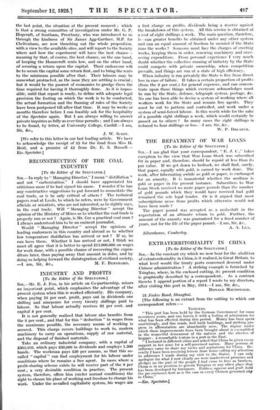INDUSTRY AND PROFITS
[To the Editor of the SPECTATOR.] SIR,—Mr. E. J. Fox, in his article on Co-partnership, misses an important point, which emphasizes the advantage of the present system when this is worked efficiently. His company, when paying 10 per cent. profit, pays out in dividends one shilling and ninepence for every twenty shillings paid to labour. So that labour actually receives 92 per cent. and capital 8 per cent.
It is not generally realized that labour also benefits from the 8 per cent., and that for this " deduction " in wages from the maximum possible, the necessary means of working is secured. This charge covers buildings to work in, modern machinery to carry on operations, supply of raw material, and the disposal of finished materials.
Take an ordinary industrial company, with a capital of £300,000, which pays £30,000 in dividends and employs 1,500 hands. The workman pays £20 per annum, so that this so- called " capital " can find employment for his labour under conditions where he remains a free agent. In cases where a profit-sharing scheme exists he will receive part of the 8 per cent., a very desirable condition in practice. The present system, therefore, offers him (under normal conditions) the right to choose his place pf working and freedom to change his work. Under the so-called capitalistic system, his wages are a first charge on profits, dividends being a reserve against the breakdown of this system. All this service is obtained at a cost of eight shillings a week. The main question, therefore, is—can greater benefits be obtained under any other system and can an equal amount of freedom be secured if the State runs the works ? Someone must face the charges of erecting works, keeping them in order, renewing machinery and over- seeing expenditure. From personal experience I very much doubt whether the collective running of industry by the State could compete with private ownership, when competition prevails, and things are run at a state of high efficiency.
When industry is run privately the State is free from direct loss in case of failure. It takes a certain proportion of profits (from the 8 per cent.) for general expenses, and can concen- trate upon those things which everyone acknowledges must be run by the State, defence, telegraph system, postage, &e. No one has been able to devise a system of working where all workers work for the State and remain free agents. They must be cut to pattern and controlled, and work under a system of semi-forced labour. Is this worth while for the sake of a possible eight shillings a week, which would certainly be passed on to others ? In many eases the eight shillings is reduced to four shillings or less.—I am, Sir, &e.., W. P. DREAPER.










































 Previous page
Previous page